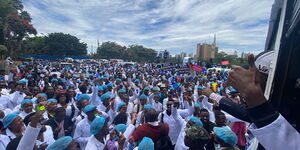New information has shed light on how the Chinese firm contracted to carry out the Jomo Kenyatta International Airport (JKIA) upgrade doctored key areas of the agreement leading to its eventual collapse.
Reports by the Standard painted a picture of a project that was questioned right from its inception during Mwai Kibaki's tenure as president, where he faced a lot of opposition regarding the project from then Prime Minister, Raila Odinga's team.
In addition, the Kenya Airports Authority (KAA) board chaired by current Embu Governor, Martin Wambora, allegedly tabled their reservations about the undertaking right from the onset but with little success as the upgrade project was pushed through.
The mega-project was awarded to China’s An Hui Construction Engineering Group Limited who went on to receive Ksh4.3 billion downpayment.
Raila’s office protested that Kibaki's henchmen were forcefully pushing through the Greenfield Terminal deal before it had been approved at the Cabinet.
However, despite communicating his misgivings through a letter to then-Attorney General, Githu Muigai, the deal was still approved.
The KAA board then made a startling discovery on May 7, 2014, upon closer scrutiny of the contract when they uncovered a few inconsistencies.
16 per cent Value Added Tax (VAT) had been sneaked into the eventual figure by the Chinese contractor, a move that resulted in an extra Ksh10 billion on the total section despite the fact that the initial tender documents clearly stating that the contractual figure was already VAT inclusive.
This new discovery is what drove the KAA board to their move to terminate the contract on grounds that the Chinese firm had changed key elements of the agreement mid-way without notification.
Not a single brick has been put in place to mark the hyped JKIA upgrade termed the Greenfield Terminal Project, with billions already down the drain, and to add insult to injury, the Chinese company have since demanded Ksh17.5 billion in claims, up and above the Ksh 4.4 billion they had demanded for works done, meaning the taxpayer is set to foot a Ksh22 billion bill for a project that never even kicked off.












